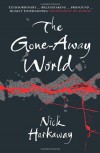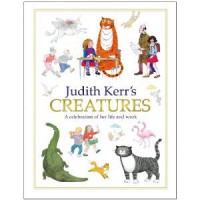Jane Eyre
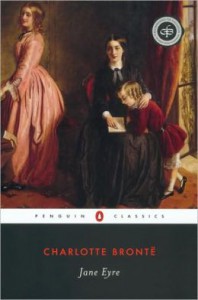 After all this time?
After all this time?Always.
***
jane and i had a troubled beginning. there was this beautiful hard back copy that sat in our living room. i saw the orson welles film sometime when i was around eight or nine, and was captivated. immediately, i wanted to try to read the book. but i couldn’t get along with the beautiful hard back. something about it just didn’t agree with me. it wasn’t until my mum gave me her old copy from school that, suddenly, everything clicked. the copy was old. the copy was falling apart (since then, some of the pages have fallen out, and the spine cover has actually fallen off too). it was orange. it was hideous.
it was perfect.
who doesn’t know the story of jane eyre? it has everything. orphans, religion, romance, betrayal, crazy attic wives, the works! it’s all so over the top and it’s fantastic. bronte creates this real feeling of repressed feelings, if that makes any sense. jane has moral boundaries for herself and by god will she stick to them. i like that in a person. maybe it’s why omar is my favourite character from the wire. though i am not directly comparing the two in any way. that would be weird.
anyway.
i much prefer charlotte’s writing to emily’s, at least in terms of emily’s one novel, wuthering heights. charlotte’s is expansive and over-the-top without being so bleak and morose and (in places) utterly batshit as emily’s. jane eyre is first and foremost a look into jane’s head, and secondly - but not any less importantly - a really good, compelling story. it is also very much of its time. the religious aspects, i feel, have to be read in the context not only of charlotte’s life as the daughter of a minister, but in the context of that period in english history. i feel in this novel, moreso than any of her other, charlotte allows the plot to overcome the religious aspect in the novel. it’s certainly far more palatable in that respect than any of her subsequent novels, if one can call “the professor” subsequent.
it’s my comfort book. it’s the book i can open at any page and start reading and feel like i’m at home. it’s the book i take everywhere. it’s nowhere near the BEST book i’ve ever read. but it does exactly what i want it to. i will read it over and over and over and never tired of the world the charlotte created (i might have to get myself a new copy though).
The Golden Notebook
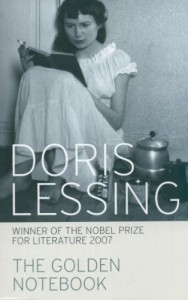 More of a 4.5 really, because of a few issues. However, I'm still fairly certain this is a masterpiece. Review to follow.
More of a 4.5 really, because of a few issues. However, I'm still fairly certain this is a masterpiece. Review to follow.
Peter Pan
 I loved this, a long time ago, but I don't remember much about it. Definitely deserves a reread.
I loved this, a long time ago, but I don't remember much about it. Definitely deserves a reread.Also, I loved the Disney Peter Pan, and Finding Neverland, but what in god's name was that horrendous live action effort they made a few years ago? Cheesy is not the word...
Let it Snow
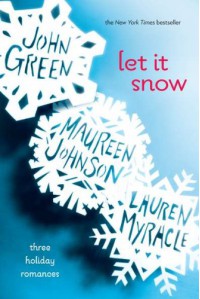 Two whole stars off for the inclusion of the hot mess that was Lauren Myracle's story and her assassination of the lovely characters introduced earlier in the volume. Yeesh. On the other hand, reading this has introduced me to Maureen Johnson, whose writing is lovely and funny and just my cup of tea in the sense-of-humour stakes.
Two whole stars off for the inclusion of the hot mess that was Lauren Myracle's story and her assassination of the lovely characters introduced earlier in the volume. Yeesh. On the other hand, reading this has introduced me to Maureen Johnson, whose writing is lovely and funny and just my cup of tea in the sense-of-humour stakes.
Looking for Alaska
 Liked this a lot better, this time round. So much so I'm upping my rating. I still don't really "get" Alaska and Miles, but I enjoy the other characters so much that it doesn't really matter.
Liked this a lot better, this time round. So much so I'm upping my rating. I still don't really "get" Alaska and Miles, but I enjoy the other characters so much that it doesn't really matter. December 21, 2012 review:
Eh. I float between three and four for this. The writing was beautiful, and Alaska's behaviour seemed totally spot on for someone suffering the trauma of a bereavement but she was also annoying as all get out. Miles was just okay. The Colonel was easily my favourite character. I... just don't have a lot to say about it, which made me give it the lower mark.
Still to hung up on The Scar. Which y'all have to read. I mean Y'ALL.
 1
1
Rebel Angels
 Not as good as the first one. Overly long, and the inconsistent characterisation really begins to show here. Ms Nightwing, with her advice at the end, seems to have done a complete volte-face on her behaviour towards Pippa with regard to Mr Bumble. Plus, I really don't get Mrs. Worthington's character or Miss Moore's, either. Their actions weren't consistent with what we already know about them ( in Miss Moore's case I realise that this may be intentional, but why, for instance, does she give away her middle name when that risks her being found out before she can get Gemma to take her to the realms?)
Not as good as the first one. Overly long, and the inconsistent characterisation really begins to show here. Ms Nightwing, with her advice at the end, seems to have done a complete volte-face on her behaviour towards Pippa with regard to Mr Bumble. Plus, I really don't get Mrs. Worthington's character or Miss Moore's, either. Their actions weren't consistent with what we already know about them ( in Miss Moore's case I realise that this may be intentional, but why, for instance, does she give away her middle name when that risks her being found out before she can get Gemma to take her to the realms?) I dunno, I have the third one here so I will read it, but I don't have any hunger for it, currently.
A Great and Terrible Beauty
 Turns out I lied - I just reread this. I didn't enjoy it as much as previously but it was still a lot of fun.
Turns out I lied - I just reread this. I didn't enjoy it as much as previously but it was still a lot of fun. ***
God I LOVED this but I would never read it again because I have a strong suspicion I wouldn't like it nearly so much. High drama, big magicks, awesome girls, and scary evil. Recommended for the 10-15 crowd.
The First Last Kiss
 Genuinely one of the worst-written, worst-edited books I have ever had the misfortune to attempt to read. Felt like it was about a thousand pages long. It takes a lot to make me give up on a book, especially something as fluffy as this, but holy mother of god, this just tested my patience too far. Special shout out for some of the clunkiest, most-wooden dialogue ever committed to paper.
Genuinely one of the worst-written, worst-edited books I have ever had the misfortune to attempt to read. Felt like it was about a thousand pages long. It takes a lot to make me give up on a book, especially something as fluffy as this, but holy mother of god, this just tested my patience too far. Special shout out for some of the clunkiest, most-wooden dialogue ever committed to paper.
The Hunger Games
 Grudgingly giving this one more star because I don't hate it quite as much as I did the first time round. Still a pretty bad book. Also Katniss is the worst, still.
Grudgingly giving this one more star because I don't hate it quite as much as I did the first time round. Still a pretty bad book. Also Katniss is the worst, still.***
First review, November 2010:
What is the point in this book?
Seriously. This book is completely pointless. It's garbage. I have no idea who on earth it's aimed at. Teenagers in the age range should surely be reading 1984 or Brave New World if they're wanting to start off with some dystopian literature? I'm not even fond of Brave New World, but surely it's a better start than this. Because this is just a MESS. For a start, the writing is dreadful. To be fair, YA literature is not always a bastion of good writing - 90% of it is crap, actually - but this... this stood out. It was hilariously bad. I mean, most of the time I write blogs/reviews/whatever in the middle of the night and I'm more than aware that my syntax/grammar/spelung often suffers for that. But this got PUBLISHED. Even though it could have been written on the back of a cereal packet. With a crayon. It has that weird feeling of being about things that are in no way suitable for children, but having been written with the general vocabulary, clumsiness, and awkwardness of someone with a writing level of a ten-year old.
Then there's the characters. Katniss (fun note: Katniss is a plant, also called Arrowhead. Katniss-the-character is good at archery. Excuse me while I KILL MYSELF) is just rubbish. She is. She's not a convincing human being at all. Pretty much her only attributes are that she: a. runs about, b. shoots things, c. if faced with a choice, will do the stupid thing. Everything about her is irritating. Nothing about her is remotely sympathetic, and mostly, I just hoped she would hurry up and get killed. I also find the way she treats Peeta (another flaming stupid name - try saying that without sounding like a three-year old trying to say Peter) annoying. While he's a horrible "Mary Sue" - for want of a better expression - he's at least trying to be nice to her. But Katniss isn't very good with people being nice to her, or nasty to her, or anything to her. I kind of imagine Katniss a bit like my dog. My dog doesn't like people much, despite the fact that everyone loves him. He doesn't even like my boyfriend, who loves dogs and despairs at this fact. He ignores people, runs away from them, and generally acts like the majority of people who don't live in my house are not in fact there - he only acknowledges us because we are the BRINGERS OF FOOD. This is because my dog is a grumpy bastard. The only things he does like are food, water, sleeping and pissing everywhere, much like Katniss (I may be exaggerating here, but you get the gist). Thing is, my dog's adorable and fuzzy and sometimes if you're lucky he'll sleep on your feet and heat them up (but not because he likes you). Katniss doesn't even have the courtesy to do that. She's just. There. Being shit and grumpy.
Anyway. Back to something vaguely resembling the topic at hand. The plot is a horrible cliche. It's painful. I read the first two yesterday, and am a few chapters into the third one, and I'm yet to discover if Collins has ever had an original thought. There's no character that isn't drawn with broad brushstrokes, no character that behaves remotely believably, just... nothing to like about this book. Also there's no sense of humour about the thing at all, and while often I CAN get over this, it's about the only thing that would have redeemed this from the heep. I don't really know why I'm still reading, except to confirm that what I think happens at the end does happen. I know that's what the internet is for, but I seem to be a glutton for punishment. Just... don't bother. It's not worth your time. There is nothing good here. Read anything else instead.
We Were Liars
 Just finished this. Initial impressions below! These are very, very spoilery btw.
Just finished this. Initial impressions below! These are very, very spoilery btw.- What happened is telegraphed pretty early on. While the exact details aren’t clear, I found it really easy to get the general gist of what was going on.
- The writing is like a mashup of Lockhart’s Ruby Oliver books (which are my favourite forever) and the things I liked about The Disreputable History of Frankie Landau-Banks (which is otherwise easily my least favourite book of hers - I pretty much loathe it). It occasionally has the humour of the RO books and it has the wordplay that I liked in FLB.
- Really, the writing is just amazing.
- I liked Cady’s characterisation. I definitely felt like I got the sense of who she was.
- However, I felt like the other characterisation was probably a bit flat. As is often the case in E. Lockhart books (even Ruby Oliver), the parents in this one are pretty terrible people but the narrative implies that you ought to feel sympathy with them which I just don’t. I’m sorry, but these are literally awful people and if the point was supposed to be "they fuck you up, your mum and dad" it certainly doesn’t come across that way. So much of the blame for the behaviour (not just in this book but in all of her books) feels like it is taken away from the parents and laid on the children.
- I liked Gat, but I don’t really understand what the whole allegory to Heathcliff was all about. I mean, I understand because of the patriarch of the family’s reaction to his race that he is an “outsider” in the same way that Heathcliff was, but what I don’t get is the part where Gat outright says that Harris is right about him, that he is Heathcliff. That sort of implied that he had the dark side in the way that Heathcliff had, but this is never shown. This made me think that somehow he was going to be primarily responsible for what happened, but he wasn’t. In fact, his presence really lessens in the latter half of the book, and while I get how that works thematically with other things in the book, it really does not work with the parallel with WH.
- I don’t think it was realistic that Cady never mentioned that she’d been seeing the other Liars to anyone. I get that she doesn’t get on with her mum and shuts her out, but you’d think it would have come up?
- I kind of hated the implication that her mum had any redeeming qualities at all, because they certainly weren’t represented in the book. She came across as a completely horrendous human being, as did her sisters (with the possible exception of the exceptionally spineless Carrie).
- I also don’t like that the suffering of the three sisters and the grandfather is so black and white and doesn’t even seem to change them, much. In this way, it reminded me of Before I Fall. It’s hard to explain what I mean, but I’ll try. The three sisters behaved in a horrible, grasping manner. So they each lose their eldest child (and Gat, who I’ll come on to again in a minute). It’s such a biblical level punishment that all it does is make them feel sorrier for themselves. Now, of course it’s a terrible thing to happen to someone. I’m not arguing that it isn’t. But it’s too terrible. It’s too dramatic. Because it’s almost impossible to feel sorry for the sisters, but you also can’t say they got their just desserts. So it just leaves you with a bit of a nasty, empty taste in your mouth.
- Finally, what is the story of Gat supposed to teach us? I don’t get that either. What about Gat’s family (his real family)? What about Gat’s friends? This could have been a really interesting exploration of privilege but all the avenues it could have gone down were closed by the premise.
I liked this book. A lot. But like a lot of Lockhart’s other work, it’s far more about the concept than the characters (outside of the main character). The Ruby Oliver books are the only books where I felt I got a true idea of the other characters outside of the narrator - I could see who they were despite Ruby seeing them from her perspective. However, each individual book Lockhart has written since then has had an interesting premise, flawless prose, a great main character (with the exception of FLB, whom I would gladly kick in the shins) and then no depth whatsoever. This is definitely the best of the rest, and I read within about two hours this afternoon, so it’s definitely one that would keep you going, but I feel like it was missing something to really bite into.
Honestly? My biggest problem with the whole thing is that I think she made the safe choice with the narrative. My assumption from the cover and what was a certainty within about ten pages was a “dead-all-along” scenario. But my feeling is that it is braver to have the characters live to overcome the awfulness of their parents than to kill them, to deal with the prejudices and problems at hand, than to erase their existence. I don’t know. Definitely a good book, probably a very good one. But I find myself wanting more than just a plot twist.
I give We Were Liars seven out of ten.
Sense and Sensibility
 It's not in my Top Three Austens but it's probably the best of the rest. I found something about Marianne terribly grating but I will probably reread it with a little more sense of perspective and hopefully not find her so much of a snivelling idiot. I'll have more to say if I do reread, I'm sure!
It's not in my Top Three Austens but it's probably the best of the rest. I found something about Marianne terribly grating but I will probably reread it with a little more sense of perspective and hopefully not find her so much of a snivelling idiot. I'll have more to say if I do reread, I'm sure!
Behind the Scenes at the Museum
 In the end, it is my belief, words are the only things that can construct a world that makes sense.
In the end, it is my belief, words are the only things that can construct a world that makes sense. If this is what Kate Atkinson's first novel is like, I am incredibly excited to explore the rest of her works. Seriously, how can someone writing their first book be this good? No, the novel isn't perfect, but it's astonishingly well crafted for someone who is apparently a novice. Atkinson creates a fascinating main character in this book, a weird, wonderful protagonist, then nests her in the stories of the other women that led to her being her, that led to her being now. There are several wonderfully crafted women here, and I'm only somewhat disappointed that I didn't get to spend more time with some of them, particularly her early relatives. I'd rather not spend much time with her mum though. The story also contains a mystery of sorts, though it's reasonably easy to guess if you think about it for long enough.
I have maybe two minor nitpicks about the story. The first is the “twist”. Like many others have said, while I found the twist easy enough to guess, the whole situation is pretty implausible. While I can just about buy Ruby having blocked out her sister's existence due to PTSD or whatever, I can't really buy the whole attitude of the family where they just never speak about her again and manage never to reveal to Ruby until fairly late in the game that she ever had a sister.
My second problem was that the end of the story seemed a tad rushed. There's all sorts of stuff that happens in Ruby's life that I'd liked to have seen more of, and I think this is that rare novel that could actually do with a few more pages, rather than a few less.
Anyway, brilliant stuff. I own Life After Life and I'll definitely be giving it a read soon based on this. I give Behind the Scenes at the Museum nine out of ten.
To the Lighthouse
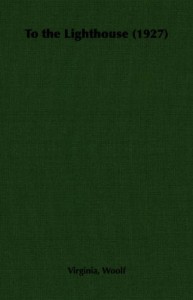 The very stone one kicks with one's boot will outlast Shakespeare.
The very stone one kicks with one's boot will outlast Shakespeare. I'm trying to think of something to say about To the Lighthouse that adequately sums up how I felt about it. And I can't. It's often been noted that it is so much harder to articulate how you feel about a book that resonates with you on every level, than it is to criticise. And it's probably true enough. Because I can't think of anything so beautiful to say as would encapsulate the feelings engendered in me by this tale, this meditation on parenthood and longing and the road not taken – and the road that has been. There's just nothing.
If you need a book to help you exorcise some ghosts, this is it.
I give To the Lighthouse ten out of ten.
The Fault in Our Stars
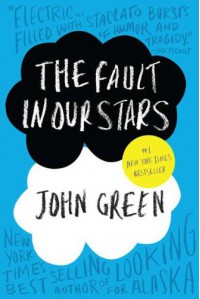 the more i think about it, the more attached to this book i get. the real review i was going to write for this (i'm not sure whether i will now) had a lot to say about loss, in particular the bereavement i suffered almost exactly a year ago. there's a lot i could say, but the more i think about this book, the more i think i don't have to say it, because someone else already has. which is pretty neat, all in.
the more i think about it, the more attached to this book i get. the real review i was going to write for this (i'm not sure whether i will now) had a lot to say about loss, in particular the bereavement i suffered almost exactly a year ago. there's a lot i could say, but the more i think about this book, the more i think i don't have to say it, because someone else already has. which is pretty neat, all in.also:
“There will come a time when all of us are dead. All of us. There will come a time when there are no human beings remaining to remember that anyone ever existed or that our species ever did anything. There will be no one left to remember Aristotle or Cleopatra, let alone you. Everything that we did and built and wrote and thought and discovered will be forgotten and all of this will have been for naught. Maybe that time is coming soon and maybe it is millions of years away, but even if we survive the collapse of our sun, we will not survive forever. There was time before organisms experienced consciousness, and there will be time after. And if the inevitability of human oblivion worries you, I encourage you to ignore it. God knows that’s what everyone else does.”
and:
“The book was turned to the page with Anne Frank's name, but what got me about it was the fact that right beneath her name there were four Aron Franks. FOUR. Four Aron Franks without museums, without historical markers, without anyone to mourn them. I silently resolved to remember and pray for the four Aron Franks as long as I was around.”
and:
“I thought of my dad telling me that the universe wants to be noticed but what we want is to be noticed by the universe, to have the universe give a shit what happens to us - not the collective idea of sentient life but each of us as individuals.”
good god, hazel, you are a girl after my own heart.
 1
1
